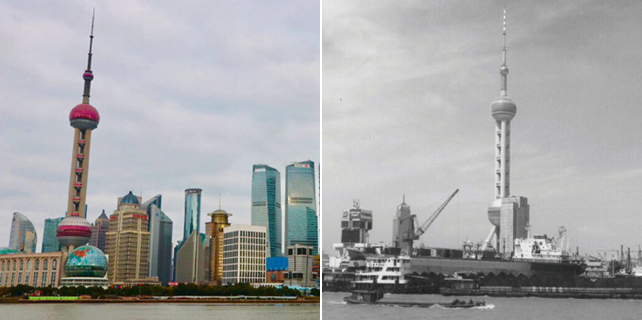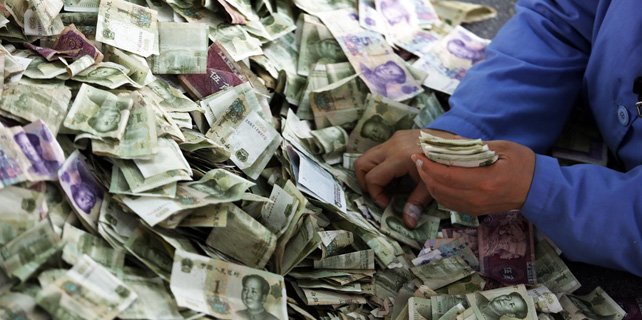Bitcoins - is the 'next big thing' in the cards?
The Bitcoin industry is looking out for more measures from the Chinese mainland authorities to regulate the freewheeling virtual currency and warn that Hong Kong authorities' laid-back approach could leave the business in limbo.
The digital currency Bitcoin had a roller-coaster start to 2017 following an eventful 2016.
The legendary but short-lived bull run for the blockchain currency in the first week of this year came to an abrupt halt as double-digit percentage drops wiped out more than a fifth of its value after the mainland's regulators stepped in.
The ups and downs highlighted the notorious volatility of the cryptocurrency. But, more importantly, the fickle performance underlines the regulatory uncertainties that have weighed on the lightly governed virtual currency.
China has become the key factor in Bitcoin's price. Exchanges in the country account for approximately 95 percent of Bitcoin trading activity worldwide. China is also home to the most powerful "miners", responsible for helping manage Bitcoin transactions and creating new units.
People active in the industry are paying close attention to prospective action by mainland regulators. Amid intensified pressure from the yuan's depreciation and a fresh bout of capital exodus, policymakers may tighten their grip on Bitcoin trading with clear regulations.
In self-administered financial hub Hong Kong, however, the digital currency remains in a regulatory limbo - authorities repeatedly warn of the high risks involved in exchanging, trading or holding the virtual commodity for speculative purposes but have no clear plans for bringing the business under supervision.
When Aurlien Menant founded Gatecoin, an online trading platform for cryptocurrency and blockchain assets, in 2013, there were no explicit guidelines from any regulatory body in Hong Kong regarding the legal and regulatory status of virtual currencies.
"Now, three years later, there is still an absence of explicit guidelines from regulators in Hong Kong with regard to the compliance requirements of exchanges and other businesses dealing with cryptocurrencies and blockchain assets," Menant told China Daily.
"In contrast, Japan remains on track to become the first jurisdiction around the world to regulate cryptocurrency exchanges under the newly drafted guidelines, while Australia is likely to follow suit this year," Menant noted.
The former banker managed to set up Gatecoin in Hong Kong by following the practice in the United States at that time. The federal financial services regulator requires digital currency exchanges in the US to register as a Money Service Business (MSB) or Money Transmitter Business (MTB).
By acquiring a Money Service Operator license - the Hong Kong equivalent of an MSB or MTB - Gatecoin sent a strong message to banks, prospective clients and regulators that it was conducting due diligence and adhering to compliance requirements as part of a common approach taken by most peer exchanges in the city, he said.
'Equivocal attitude'
A Hong Kong-based financial technology company Anx International said: "In Hong Kong, the (Hong Kong Monetary Authority) has clarified that Bitcoin is not legal tender, but a 'virtual commodity'. So far, Bitcoin and other similar virtual commodities are not currently regulated by the HKMA or the Securities and Futures Commission (SFC)."
George Harrap - co-founder and chief executive of Bitspark, another Hong Kong-based Bitcoin trading platform - said: "Basically, Bitcoin is not something regulated in Hong Kong or something a regulatory authority will even issue any approval or license for. "The landscape for Bitcoin regulation in the territory is essentially that there's none." Regulators' equivocal attitude and a less "forward-thinking mentality" are hampering the city's bid to sharpen its edge as a fintech hub, Harrap warned.
The HKMA may claim that a dearth of rules was meant to make Hong Kong open for anyone starting their business. But what worried Harrap was that promising companies, beset with Hong Kong's out-of-date regulations and zero flexibility, may vote with their feet and migrate to more appealing jurisdictions.
Such a concern seems not to be merely alarmist rhetoric.
Xu Mingxing, founder and chief executive of OKCoin - one of the mainland's largest bitcoin exchanges - doubted his business would thrive in Hong Kong in the next few years despite the company's Hong Kong office having been set up in August last year. Xu founded his business in Beijing three years ago.
"Everything concerning fintech moves at a relatively slower pace in Hong Kong, compared with the mainland and other oft-cited rival cities. While mainland regulators take the attitude of 'letting the bullet fly for a while' toward fintech innovations, Hong Kong policymakers are known for their prudence and conservativeness in giving fintech a shot," Xu told China Daily.
"Unseen regulatory hurdles really have our hands and feet bound in Hong Kong, where I could hardly see regulators map out a clear regulatory landscape for the Bitcoin business. For now, I have no idea how to play the game here," he added.
The SAR's financial regulators, including the HKMA, SFC, the Office of the Commissioner of Insurance and the Customs and Excise Department, have reiterated they would like to remain sober-minded about the highly sought-after fintech business before having a full picture of the fintech's characteristics, potential and risks and setting up a clear regulatory framework.
Charles Ma, a consultant at one of the "Big Four" accounting firms in Hong Kong, said it was definitely no easy task to put digital assets into a regulatory framework. As a cluster of scandals have rocked the local Bitcoin scene, the lingering concerns about the unit's security, transparency and price volatility have continued to cast a shadow over the sector, he noted.
In 2015, Hong Kong-based Bitcoin trading platform MyCoin was abandoned by its owners who allegedly ran a Ponzi scheme that defrauded nearly 3,000 Hong Kong and mainland investors of about HK$3 billion.
Ma believed discouraging local people from engaging in speculative activities or transactions without considering the risks involved was not enough. The tricky part was that if regulators hesitated to play a part, the chaotic market may overshadow the potential of the possible "next big thing" as investors fall prey to frauds and market confidence was dampened.
Hong Kong's Secretary for Financial Services and the Treasury Ceajer Chan Ka-keung has said Bitcoins do not pose a significant threat to the city's financial system since they are not widely accepted and circulation is limited. Thus, he said, there isn't any need at present for new legislation to regulate trading in such virtual commodities.
Such a mindset may explain why market players could not expect too much regulatory change. "Given that the much-coveted Stored Valued Facility License came about in Hong Kong almost two decades after similar licenses in Europe, we doubt the HKMA will change its stance on blockchain assets anytime soon," said Menant.
"I don't think anything will happen again until either there is a knee-jerk reaction to something bad happening or where notable businesses leave to go elsewhere," he noted.
But the clamor for guidelines from such a self-regulated industry is always there.
ANX International warned: "The question of regulation of digital assets and blockchain is proving as challenging for Hong Kong as it has in other jurisdictions. However, without a clear regulatory framework for fintech businesses, Hong Kong may find it difficult to encourage the use of innovative technology in financial services or business structures and there's a risk of unscrupulous or inexperienced businesses damaging the industry generally."
sophia@chinadailyhk.com
















